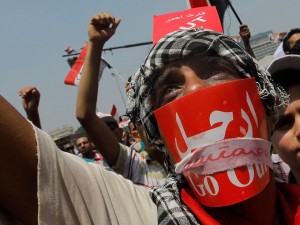 The toppling of Egyptian President Mohamed Mursi divided the Middle East on Thursday, with Tunisia’s ruling Islamists denouncing it as a coup while Gulf Arab leaders celebrated.
The toppling of Egyptian President Mohamed Mursi divided the Middle East on Thursday, with Tunisia’s ruling Islamists denouncing it as a coup while Gulf Arab leaders celebrated.
The United States expressed concern at the overthrow of the elected Mursi and his Muslim Brotherhood and called for a swift return to democracy, as did the European Union. But they stopped short of calling it a coup, which might have led to sanctions.
The 54-nation African Union was likely to suspend Egypt for allowing “unconstitutional change”, a senior AU source told Reuters.
Across the Middle East, governments reacted to Mursi’s fall in ways that reflected their embrace or loathing of political Islam.
“Military intervention is totally unacceptable and we call on Egypt to ensure that Mursi is physically protected,” said President Moncef Marzouki of Tunisia. The ruling Islamist party, Ennahda, condemned what it called a “coup against legitimacy”.
Ennahda’s rise closely mirrored that of Mursi’s Brotherhood: both won power after Arab Spring revolutions toppled secular autocrats in Tunisia, then Egypt, in 2011. Since then the divide between secularists and Islamists, which helped to bring down Mursi, has also widened in Tunisia.
Turkey, a secular Muslim nation rocked by weeks of anti-government protests, was harshly critical of Egypt’s army.
“It is unacceptable for a government that has come to power through democratic elections to be toppled through illicit means and, even more, a military coup,” Foreign Minister Ahmet Davutoglu said.
But for Gulf Arab states, which see Egypt as a strategic ally against any threat from non-Arab Iran across the Gulf, the appointment of constitutional court chief Adli Mansour as interim leader was met with congratulations and evident relief.
The president of the United Arab Emirates, Sheikh Khalifa bin Zayed al-Nahayan, spoke of his “consideration and satisfaction” in a cable to Mansour.
Saudi King Abdullah sent a message of congratulations “in this critical period of … history”. Kuwait’s ruler, Sheikh Sabah al-Ahmad al-Sabah, was quoted as praising Egypt’s armed forces for the “positive and historic role” they played in preserving stability.
QATAR CHANGES TACK
Qatar, the only Gulf Arab state that backed Mursi’s Muslim Brotherhood, switched tack by welcoming the new leader on Thursday, in an apparent attempt to salvage diplomatic prestige. The official news agency reported that cables of congratulation had been sent to Mansour by Qatar’s new emir, Sheikh Tamim bin Hamad al-Thani.
Qatar has been a major financier of Islamist groups around the Arab World and had provided billions of dollars in aid to Egypt since the 2011 revolution that ended the autocratic rule of Hosni Mubarak.
Iraq said it stood with the Egyptian people and was ready to “develop relations between the two brotherly countries on the highest level”.
But Iran, which sought to repair its strained ties with Egypt after Mursi’s election a year ago, gave a guarded response.
“Certainly the resistant nation of Egypt will protect its independence and greatness from foreign and enemy opportunism during the difficult conditions that follow,” Fars news agency quoted Foreign Ministry spokesman Abbas Araqchi as saying.
Mursi visited Tehran on one of his first official trips abroad, but the two countries have found themselves supporting opposite sides of a civil war in Syria that has taken on increasingly sectarian overtones.
Syria, fighting to crush a two-year-old uprising against President Bashar al-Assad, urged Mursi to step down on Wednesday and realize “that the overwhelming majority of the Egyptian people reject him”, Information Minister Omran Zoabi said.
Neighboring Israel avoided any show of satisfaction over Mursi’s ouster, although a confidant of Prime Minister Benjamin Netanyahu expressed hope Mansour’s appointment would lead to the restoration of largely frozen contacts with Cairo.
“Yesterday’s events strengthen the feeling that perhaps we have passed the bad period and perhaps now there will be a chance to have diplomatic ties with whomever will govern Egypt in the near future,” Tzachi Hanegbi told Army Radio.
Mursi’s departure cheered Western-backed Palestinian President Mahmoud Abbas, whose Fatah faction is at loggerheads with the militant group Hamas, an offshoot of Mursi’s Muslim Brotherhood.
Abbas had only words of praise for the Egyptian military, saying the armed forces had prevented Egypt’s “slide toward an unknown fate”.
Hamas reaction was muted to the fall of its sympathetic neighbor. A Hamas official, Ehab Ghussein, told Reuters: “We pray to God to preserve the security and the stability of Egypt and its people and to prevent bloodshed.”
Reuters

Leave a Reply
You must be logged in to post a comment.